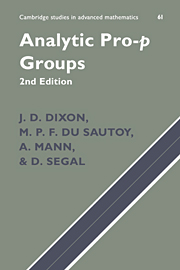Book contents
- Frontmatter
- Contents
- Preface
- Introduction
- Notation
- Prelude A reminder
- Part I Pro-p groups
- Part II Analytic groups
- Part III Further topics
- 10 Pro-p groups of finite coclass
- 11 Dimension subgroup methods
- 12 Some graded algebras
- Interlude D The Golod–Shafarevich inequality
- Interlude E Groups of sub-exponential growth
- 13 Analytic groups over pro-p rings
- Appendix A The Hall–Petrescu formula
- Appendix B Topological groups
- Bibliography
- Index
10 - Pro-p groups of finite coclass
Published online by Cambridge University Press: 03 December 2009
- Frontmatter
- Contents
- Preface
- Introduction
- Notation
- Prelude A reminder
- Part I Pro-p groups
- Part II Analytic groups
- Part III Further topics
- 10 Pro-p groups of finite coclass
- 11 Dimension subgroup methods
- 12 Some graded algebras
- Interlude D The Golod–Shafarevich inequality
- Interlude E Groups of sub-exponential growth
- 13 Analytic groups over pro-p rings
- Appendix A The Hall–Petrescu formula
- Appendix B Topological groups
- Bibliography
- Index
Summary
Until relatively recently, it was received wisdom that there was no point in trying to classify finite p-groups up to isomorphism: there are just too many of them. Received wisdom was flouted in 1980 by Charles Leedham-Green and Mike Newman, who formulated a series of conjectures that amount to no less than a programme for the classification of all finite groups of prime-power order.
Quite remarkably, not only did the conjectures turn out to be exactly correct, but they were proved, over a period of about ten years, by following the guidelines proposed in the original paper of Leedham-Green and Newman.
We shall not repeat the conjectures, nor relate the interesting history and prehistory of their ultimate success; some pointers to the relevant literature are provided in the Notes at the end of the chapter. Our aim here is to explain how pro-p groups come into the picture, and to give a self-contained account of that part of the theory that relates to pro-p groups. Apart from its original motivation in the classification of finite groups, this makes a beautiful chapter in the theory of pro-p groups of finite rank.
The primary invariant used in the classification is the coclass of a finite p-group: the coclass of a group G of order pn is n – c where c is the nilpotency class of G.
- Type
- Chapter
- Information
- Analytic Pro-P Groups , pp. 243 - 269Publisher: Cambridge University PressPrint publication year: 1999



